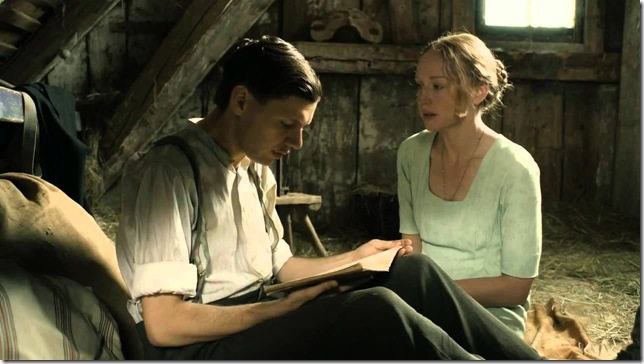Closed Season is a spartan movie for a spartan time. It opens in a dusty kibbutz in Israel in 1970, where a young entomologist in a pressed shirt aims to question a stoic farmer named Albert about his past. He finally does, and the next 100 minutes or so re-create that past, in a secluded farm on the border of Germany and Switzerland.
It’s 1942, and Albert (Christian Friedel), now a young Jewish refugee fleeing the Third Reich, is discovered by Fritz (Hans-Jochen Wagner), a blocky, ogreish homesteader and poacher. Instead of turning in his quarry to his friendly neighborhood Nazi, Fritz hides Albert, enlisting his services as a farmhand in return for room, board and, ultimately, an intimate favor: In light of Fritz’s bedroom difficulties, Albert will have sex with Fritz’s wife Emma (Brigitte Hobmeier) enough times to provide the marriage an heir. You could guess that this situation won’t end well, and you’d be right.
This first feature from German director Franziska Schlotterer is an oppressively stark tragedy. She paints her images with a palette of muted everything, including emotions. Fritz and Emma’s marriage is monastic and deadened; she’s an old 30, reduced to the pleasureless grind of cook and laundress, and he treats her with callous neglect, like she’s little more than an animal on his property, existing to serve practical functions. They appear to have not shared a smile in 10 years.
Moody and denuded, Closed Season’s pacing is virtually comatose until Fritz and Albert’s disastrous agreement commences. Then, like Emma, it comes alive. An arrangement that, for Fritz, is intended to be a rigorous, procreative formality awakens Emma’s forever-dormant libido, and she begins to self-actualize with every tryst. She emerges from buttoned-down servant to beautiful, carnal woman — from object to subject — and our pity transfers eloquently to Fritz, who can only listen to the creaking bedframes, head sunken, from the next room.
Schlotterer wrote the screenplay with Gwendolyn Bellmann, and they wisely value glances over words, atmosphere over action. The post-coital looks exchanged by Albert, as he saws a branch off a tree, and Emma, as she places undergarments on a laundry line, speak more than any verbal exchange could. In a later scene in a hayloft, with its furtive sexual possibilities weighing on both of them, unspoken desires and future possibilities dance across their eyes, doing all of the talking.
Schlotterer also favors a minimalist soundtrack. The film has a composer, Ari Benjamin Meyers, but I never noticed his contributions. The director generates more texture from everyday farm sounds — sexual repression in the chopping of wood, frustration in the forceful thuds of steins slamming on tables — than with the customary swells of string instruments.
That said, when dialogue is deployed, it is rife with literary double entendre. Speaking of a beloved cow, Emma asks Fritz, “Resi isn’t producing milk—shall we send for the butcher?” Later on, he concedes that “a cow without milk has got to go,” and in another scene Fritz orders Albert to remove a tree that “hasn’t born apples in years.” When fruitfulness is constantly equated with self-worth, it’s easy to understand the mortal implications of Fritz’s dysfunction, especially in the face of his vigorous cohabitants.
Closed Season is a Venn diagram in which impotence (Fritz), subjugation (Emma) and persecution (Albert) converge, their overlap shrouded in secrets, misconceptions and sacrifices. Some viewers will want at least as a sliver of hope to grasp on to when the credits begin their bleak ascent up the screen, but Schlotterer sticks firmly to her guns, producing a loveless triangle for a joyless era.
CLOSED SEASON. Director: Franziska Schlotterer; Cast: Christian Friedel, Brigitte Hobmeier, Hans-Jochen Wagner, Thomas Loibl, Rami Heuberger; in German with English subtitles; Distributor: Menemsha; Rating: NR; Opens: Friday at Movies of Lake Worth, Movies of Delray, Living Room Theaters in Boca Raton, and Cinema Paradiso in Fort Lauderdale
